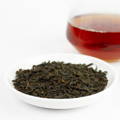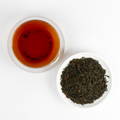What is Japanese Black Tea and How to Brew it - Benifuuki Wakoucha
100% organic and grown in Haraizumi, Shizuoka. This Japanese black tea is like no other black tea you've ever tasted. Rich, malty with a natural sweetness of ripened fruit and some citrus notes.
What is Benifuuki
Benifuuki is a cultivar of the Camellia sinensis plant and is cultivated in every region in Japan due to its high resistance to the environment and diseases compared to Yabukita (Yabukita is the most popular cultivar for green tea production)
The word Benifuuki or sometimes spelt Benifūki means "red riches" and its development dates back to the 1960s by crossbreeding two other cultivars Benihomare and Makura CD86.
The Benifuuki cultivar is known to have high levels of a natural compound called methylated catechins and EGCG, which are a type of flavonoid that has antioxidant properties.
These methylated catechins are believed to have a variety of health benefits, including anti-inflammatory and anti-allergy properties.
In Japan, Benifuuki as a green tea is often recommended for people with allergies or other inflammatory conditions.
So what is Wakoucha?
Wakoucha is derived from the Japanese words "wa", which means Japan, and "koucha", which translates as black tea.
When Benifuuki is processed as a green tea the taste can be quite bitter due to the high content of methylated catechins.
However when Benifuuki is processed as a black tea (Wakoucha) the methylated catechins are converted into tannins that bring out those ripened fruit flavours and removes the bitterness from the tea.
This is because during the processing of black tea, the tea leaves are oxidised causing the colour of the leaves to change from green to brown.
Black teas are unique and somewhat rare in Japan. Although Japan is primarily known for its green teas like Sencha and Gyokuro, it also produces a few specialty black teas annually. Unlike traditional black teas from China and India, Wakoucha has a lighter and more delicate flavour profile, with a reddish colour and a naturally sweet taste.

How much caffeine in Benifuuki Wakoucha?
The caffeine content in this Japanese black tea is moderate and less than half as much as a cup of coffee.
Is Japanese Black tea different from traditional black teas in taste?
When compared to Indian and Sri Lankan black teas, Japanese black teas have a less astringent and bitter taste, with a more prominent floral and honey aroma.
Japanese black teas offer a lighter and more delicate flavour profile with a higher level of sweetness with hints of ripened fruits and citrus notes.
This Benifuuki Wakoucha can equally be enjoyed with or without milk.
What is the difference between Japanese black tea and Japanese green tea?
There is a common misconception about the different types of tea, that each type is produced from a specific plant, such as one plant for green tea and another for black tea. However, the truth is that all types of green and black tea come from the Camellia sinensis plant and are processed differently to produce various tea types.
Green teas are either pan-fried or steamed, depending on their country of origin. Japanese green teas, for instance, are mostly steamed to prevent oxidation, which helps to preserve their green colour.
In contrast, black teas are fully oxidised. The leaves intended for black tea are left to wither for at least 16 hours, then rolled to accelerate oxidation before being dried and stored.
How to brew Japanese black tea (Benifuuki Wakoucha)
We suggest brewing between 85°C - 90°C for 2 minutes with multiple infusions. You can definitely brew this tea for longer to create a bolder and stronger infusion. In such case we can suggest that a drop of milk might be a good idea.
Tea Brewing Temperature Chart











